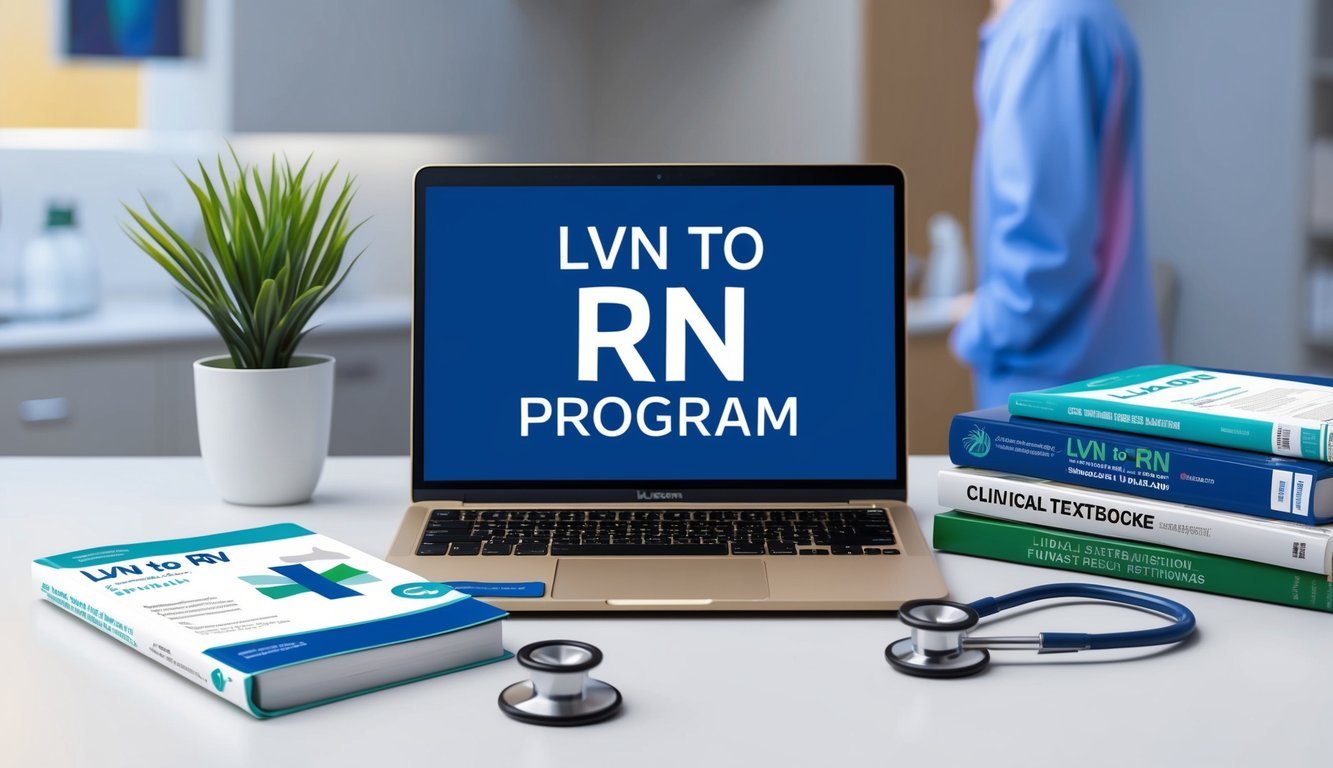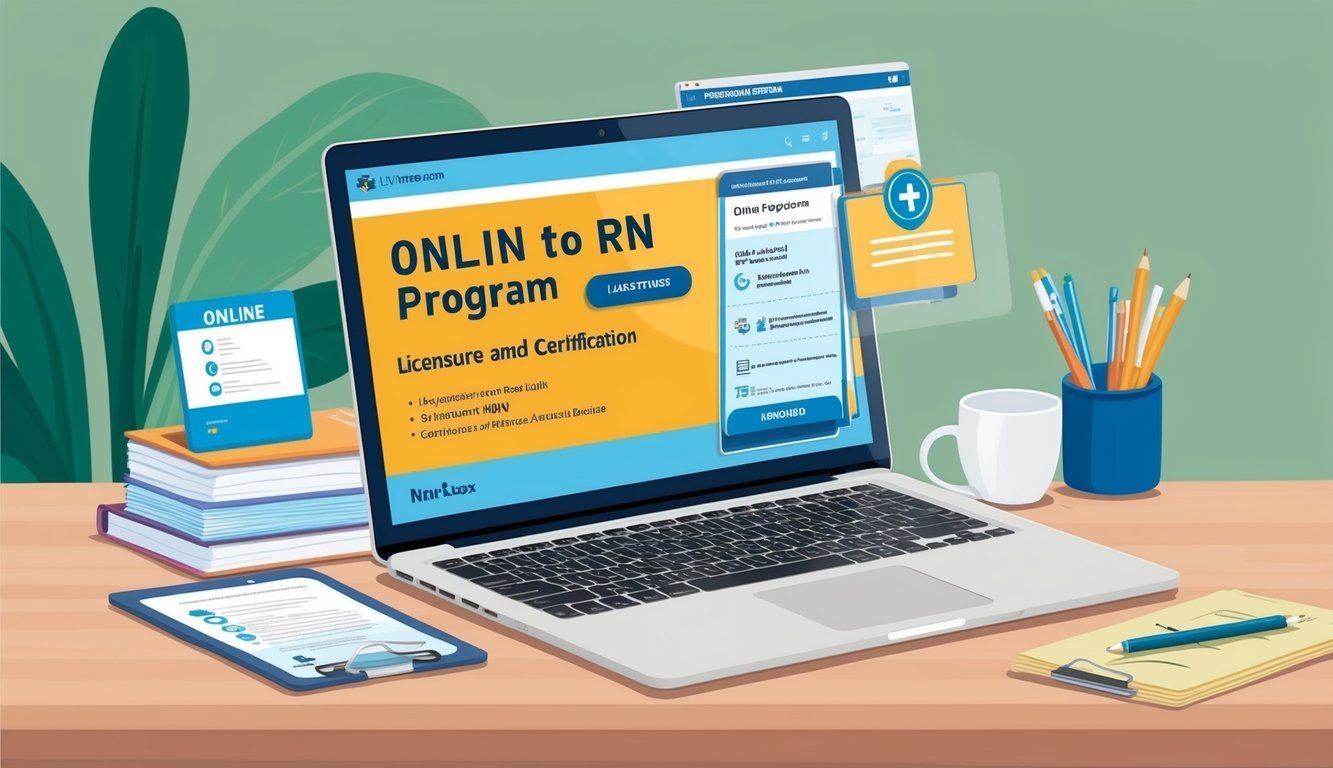Transitioning from LVN to RN can greatly enhance your nursing career. Online LVN to RN programs offer a flexible and efficient path to achieving your goals.
Many institutions provide quality education that fits your schedule.
With these programs, you can earn your degree while maintaining your current job or personal commitments.
These programs generally require you to complete specific prerequisites and meet certain admission criteria.
Once accepted, you’ll engage with a curriculum that combines theoretical knowledge and practical skills through clinical experiences.
This blend prepares you not just for the licensing exam, but also for a rewarding career in nursing.
Whether you aspire to work in hospitals, clinics, or specialized care facilities, advancing to RN opens doors to numerous opportunities.
With the rise of online education, pursuing this path has never been more accessible for busy professionals like you.
Key Takeaways
- Online LVN to RN programs provide flexibility for working students.
- Specific prerequisites and admission criteria ensure readiness for the program.
- Advancing to RN enhances career prospects and opportunities in nursing.
Exploring LVN to RN Bridge Programs
LVN to RN Bridge Programs are designed to help Licensed Vocational Nurses (LVNs) or Licensed Practical Nurses (LPNs) advance their careers by becoming Registered Nurses (RNs).
These programs provide necessary training and education while accommodating your need for flexibility.
Overview of Bridge Programs
Bridge programs typically focus on building on your existing knowledge and experience as a practical nurse.
The curriculum covers advanced nursing topics, clinical skills, and patient care.
Here are some key features of these programs:
| Feature | Details |
|---|---|
| Duration | Ranges from 9 months to 2 years |
| Format | Online, hybrid, or on-campus |
| Prerequisites | Must hold a valid LPN/LVN license and transcripts |
| Clinical Experience | Required for hands-on learning |
Many institutions offer a variety of pathways.
Some programs are fully online, while others include in-person clinicals, helping you balance work and education.
Advantages of Online Programs
Online LVN to RN programs have distinct benefits that cater to your needs as a busy professional.
- Flexibility: You can often set your own schedule, allowing you to balance work, family, and study time effectively.
- Accessibility: With online learning, you can attend classes from anywhere, making it easier to find a program that fits your location.
These programs are designed to fit various learning styles.
You’ll typically find a mix of video lectures, interactive discussions, and online assessments.
Further, schools often provide resources such as tutoring and career services to support your educational journey.
Programs like the ones at Nurse.org and SJVC are examples of options available to you.
Admission Criteria and Prerequisites
Understanding what is required to apply for an LVN to RN program online is essential.
Each program may have unique criteria, but there are common elements you will need to consider before applying.
Understanding the Admission Process
To begin the admission process, you will typically need to submit an application form.
This form often requires information about your educational background and work experience.
In addition to the completed application, many schools require an entrance exam score.
This can help demonstrate your readiness for nursing coursework.
You may also need to provide a valid LPN license, proof of your high school diploma, and a minimum cumulative GPA, usually around 2.5 or higher.
Be sure to check the specific requirements of each program as they can vary significantly.
Prerequisite Coursework and Requirements
Most LVN to RN programs require certain prerequisite courses before you can apply.
Common required classes include:
- Anatomy and Physiology
- Microbiology
- Nutrition
- Psychology or Sociology
These courses lay a strong foundation for your nursing education.
Some programs may also ask for additional coursework in subjects like statistics or chemistry.
Before applying, ensure that you meet these prerequisites.
In many cases, schools will not consider your application unless all required courses are completed with a satisfactory grade.
Reviewing these requirements in advance can help you stay organized and ready for a smooth application process.
Curriculum and Clinical Requirements

In LVN to RN programs, you will encounter essential nursing education components and practical experiences.
These elements are crucial for building the knowledge and skills necessary for a successful nursing career.
Key Nursing Education Components
Your program will include various nursing courses that cover a wide range of topics.
Here are some key subjects you can expect:
| Course | Description |
|---|---|
| Nursing Theory | Focuses on the principles and concepts guiding nursing practices. |
| Anatomy and Physiology | Covers the structure and function of the human body. |
| Pharmacology | Teaches about medications, their effects, and safe administration. |
| Microbiology | Introduces microorganisms, their impact on health, and infection control. |
| Health Assessment | Emphasizes evaluating patient health through observation and testing. |
You will also develop important nursing skills during your coursework.
These include patient care techniques, communication skills, and critical thinking.
Integrating Clinical Experiences
Clinical practicums are vital as they provide hands-on experience in real healthcare settings.
You will work under the guidance of experienced nurses.
During these practicum experiences, you’ll practice essential skills, such as:
- Patient Care: Learning to provide compassionate and effective care to patients.
- Health Assessments: Conducting physical exams and interpreting findings.
- Collaboration: Working with healthcare teams to develop care plans.
These experiences will enhance your understanding of nursing theory and prepare you for real-world challenges.
Engaging in clinical practice is an integral part of your education, ensuring you are ready to meet the demands of the nursing profession.
Licensure and Certification

After completing your LVN to RN program, you’ll need to navigate the licensure process.
This involves several key steps, including preparing for the NCLEX-RN exam and meeting state-specific licensing requirements.
Understanding these steps is essential for your career transition.
Preparing for the NCLEX-RN
The NCLEX-RN exam is a crucial step in obtaining your RN license.
To prepare effectively, focus on the following:
-
Study Materials: Utilize NCLEX-RN review books, online courses, and practice exams. Resources like Kaplan and UWorld can provide valuable practice questions.
-
Study Schedule: Create a study plan that covers all topics. Aim for consistency, dedicating certain hours each day to specific subjects.
-
Test-Taking Strategies: Learn how to approach multiple-choice questions, including prioritization and critical thinking.
Passing the NCLEX-RN demonstrates your competency and readiness to practice as a registered nurse.
State-Specific Licensure Requirements
Each state has its own requirements for RN licensure.
Here’s a general overview of what you may need:
-
Application: Complete a state application for licensure along with the required fees.
-
Background Check: Most states require a criminal background check. Be prepared to submit fingerprints.
-
BLS/CPR Certification: Many states require proof of Basic Life Support (BLS) or CPR certification. Check with your state board for specifics.
-
Vaccinations: Some states may have vaccination requirements for healthcare workers, which can include immunizations for Hepatitis B, MMR, and Influenza.
To find state-specific information, visit the NCSBN website for detailed guidelines.
This information ensures that you meet all necessary criteria for licensure in your state.
Advancement and Career Opportunities
Transitioning from LVN to RN opens up various paths for professional growth and higher earnings.
As a registered nurse, you can explore advanced degrees and leadership roles, enhancing your career potential while enjoying better salary prospects.
From RN to BSN and Beyond
Completing a Bachelor of Science in Nursing (BSN) can significantly expand your career opportunities.
Many employers prefer or require a BSN for positions in management, nursing education, and specialized fields.
With a BSN, you may also consider pursuing advanced degrees like a Master of Science in Nursing (MSN) or even a Doctor of Nursing Practice (DNP).
These qualifications enable you to explore careers in nursing leadership, nurse practitioner roles, or healthcare administration.
Key Career Opportunities after BSN:
- Charge Nurse
- Nurse Educator
- Nurse Manager
- Nurse Practitioner
Employment Outlook for Registered Nurses
The employment outlook for registered nurses is strong.
The Bureau of Labor Statistics projects a growth rate of 6% from 2021 to 2031, driven by an increasing demand for healthcare services.
Registered nurses generally earn higher salaries than licensed vocational nurses.
According to recent data, the average registered nurse salary is around $77,600 per year, while LVNs average approximately $50,000.
Factors Influencing Salaries:
- Education Level (BSN vs. ADN)
- Experience
- Specialization (e.g., pediatrics, geriatrics)
Advancing your education and experience opens doors to diverse roles and leadership opportunities in healthcare, enhancing your career satisfaction and professional impact.
Frequently Asked Questions
This section addresses common inquiries about LVN to RN programs available online.
You will find information on accreditation, program durations, top institutions, pathways specific to California, licensure exam eligibility, and rapid completion options.
What are the accreditation requirements for online LVN to RN programs?
Accreditation for online LVN to RN programs is crucial.
You should ensure that the program is accredited by organizations recognized by the U.S. Department of Education.
Common accrediting bodies include the Accreditation Commission for Education in Nursing (ACEN) and the Commission on Collegiate Nursing Education (CCNE).
How do the durations of LPN to RN bridge programs vary?
The duration of LPN to RN bridge programs can vary widely.
Typically, these programs take between 1 to 3 years to complete, depending on the type of degree.
Associate Degree in Nursing (ADN) programs usually take about 1 to 2 years, while Bachelor of Science in Nursing (BSN) programs may take 3 to 4 years.
Which institutions offer the best LPN to RN online bridge programs?
Several institutions are known for their excellent LPN to RN online bridge programs.
Some highly regarded options include:
| Institution Name | Program Type | Duration |
|---|---|---|
| Saint Martin’s University | LPN to BSN | 2 years |
| University of Texas at Arlington | LPN to RN or BSN | 15-24 months |
| Chamberlain University | Online BSN program | 3 years |
What are the specific pathway options for LPNs to transition to RNs in California?
In California, LPNs have several pathways to become RNs.
You can choose a 30-unit option, which allows you to take specific courses.
Alternatively, you may enroll in an ADN or BSN program.
These programs may include more comprehensive training as well as eligibility for the RN licensure exam.
Can LVNs legally challenge the RN licensure exam without completing an RN program?
In most cases, LVNs cannot challenge the RN licensure exam without completing an accredited RN program.
However, California offers a special 30-unit option that allows LVNs to take the exam without completing a full RN program.
This option requires specific coursework and clinical experience.
Are there any online LPN to RN programs that offer rapid completion timelines?
Yes, some online LPN to RN programs offer accelerated timelines for completion.
You may be able to finish in as little as 12 to 18 months if you meet specific eligibility criteria and can handle a full course load.
Check with individual schools for their accelerated options and requirements.

